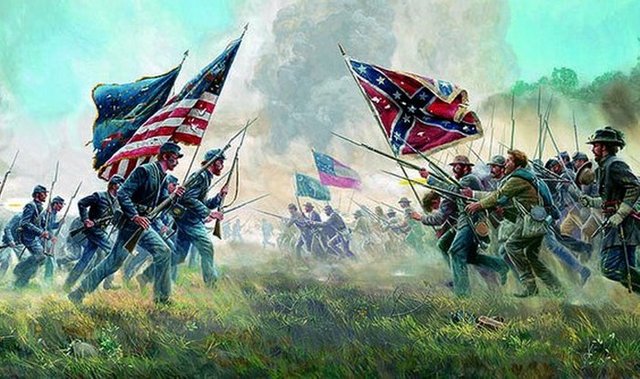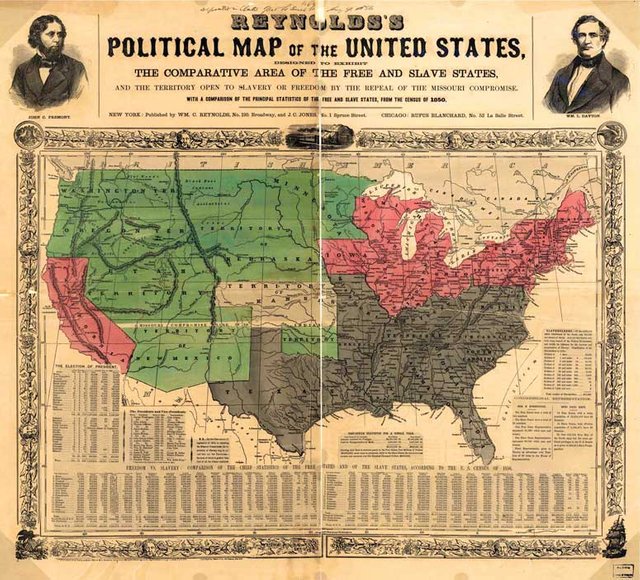
The American Civil War resulted directly from the political controversy surrounding slavery. There were many events that heightened political tensions and prevented peaceful compromise between the North and South, but all of these issues, from the three-fifths compromise to the Dred Scott decision, inevitably sprung from the greater issue of slavery in general.
Slavery became a national controversy as early as the 1787 implementation of the three-fifths compromise, which afforded southern, slave-holding states a significant boost in congressional representation. Northern states, several of which had already expressed public distaste for the institution of slavery, now saw this same institution encroaching upon their political power. The resulting tensions were exacerbated in the nineteenth century as new territories were added to the union, threatening to tip the political balance in favor of either side. In the wake of the Kansas-Nebraska Act of 1854, supporters from both North and South flooded into Kansas hoping to tip the state laws in their own favor. The Republican party emerged in protest of the Kansas-Nebraska Act, vehemently opposing the spread of slavery into new territories.

Meanwhile, slavery was creating political turmoil in regards to the nature and extent of states' rights. The Fugitive Slave Act of 1850 and the Dred Scott decision of 1857 both called state sovereignty into question, and fueled resentment from Northern states. The Fugitive Slave Act mandated that fugitive slaves be returned to their masters, even if they were found in a state in which slavery had been outlawed. The Scott v. Sanford Supreme Court decision took things a step further, declaring that people of color could not ever be citizens, and thus had no grounds to sue for their freedom. This proclamation enraged the Republicans, who feared that the decision paved the way for a federally sanctioned expansion of slavery into the Western territories.
The Civil War was directly instigated by the presidential election of 1860, in which Abraham Lincoln, a Republican and opponent of slavery, won control of the executive branch. Faced with dwindling congressional power and a sworn enemy as president, several southern states chose to secede from the union, capturing federal outposts and declaring themselves the Confederacy. Lincoln and his Democratic predecessor Buchanan both declared secession illegal and meaningless. According to Lincoln, the "more perfect" union established by the constitution was meant to be perpetual, and was not merely a compact between sovereign states. Peace conferences failed, and the Confederate siege of Fort Sumter marked the beginning of the Civil War.

Throughout the war, the North possessed several key advantages. They had significantly more soldiers and better access to equipment and medicine. Their "scorched Earth" strategy decimated much of the South's infrastructure. For quite some time, however, this was not enough, and the outcome of the war remained uncertain. The South had the homefield advantage. The farther the Union troops advanced, the more strain was placed on their supply lines and communication. In hopes of invigorating the war efforts, Lincoln issued the Emancipation Proclamation on January 1, 1863, which called for the abolition of slavery in the rebel states and permitted thousands of former slaves to join in the war efforts.
Overlooking the Mississippi River, Vicksburg was a focal point of the war. Control of Vicksburg meant control over the Mississippi River, an essential supply line and gateway to the West. After a long siege, Ulysses S. Grant finally took control of the town in July of 1863, earning himself a promotion in the process. Meanwhile, Robert E Lee was advancing northward, trying to penetrate Pennsylvania and force the Union to withdraw from the war. Lee's forces were met and ultimately defeated in the Battle of Gettysburg, the bloodiest battle of the war and also a significant turning point.
By 1864, another election year, things were still very uncertain. Lincoln's political opposition was advocating a negotiated peace and an end to the war efforts, a stance that was rapidly gaining popularity due to the toll of the war. Lincoln and his newly-appointed general Ulysses S. Grant devised a strategy of simultaneous offensives, which strained the Confederacy and thwarted their attempts at moving reinforcements. While Grant faced Robert E. Lee's forces in Virginia, William Sherman's troops took control of Atlanta, securing Lincoln's reelection and the Union's victory in the war. On April 9th, 1865, having retreated from Petersburg, Lee found himself cornered by Grant at Appomattox Court House in Virginia. He surrendered to Grant, and this event triggered a rapid end to the war. Confederate president Jefferson Davis was captured on May 10th, 1865, shortly after the assassination of Abraham Lincoln.
Cover Photo: Image Source
I like movies and stories about fine civil war. But I think it's not entirely true
Downvoting a post can decrease pending rewards and make it less visible. Common reasons:
Submit